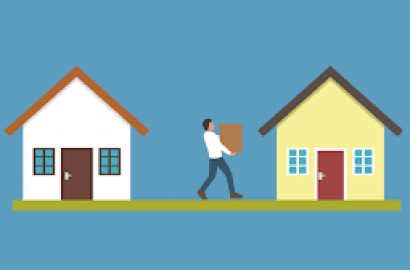Buying a home can be challenging for a first-timer. After all, there are so many steps, tasks, and requirements, and you may be anxious about making an expensive mistake. But first-time homebuyers actually enjoy some special advantages created to encourage new entrants into the real estate market. To demystify the process so you get the most out of your purchase, here is a rundown of what you need to consider before you buy and what you can expect from the buying process itself, plus tips to make life easier after you buy your first home.
Your first step is to determine what your long-term goals are and how homeownership fits in with those goals. Perhaps you're simply looking to transform all those "wasted" rent payments into mortgage payments that give you something tangible: equity. Or maybe you see homeownership as a sign of independence and enjoy the idea of being your own landlord. Buying a home can also be a good investment. Narrowing down your big-picture homeownership goals will point you in the right direction. Here are six questions to consider.
1. How's your financial health?
Before clicking through pages of online listings or falling in love with your dream home, do a serious audit of your finances. You need to be prepared for both the purchase and the ongoing expenses of a home. The outcome of this audit will tell you whether you're ready to take this big step, or if you need to do more to prepare. Follow these steps:
Look at your savings. Don't even consider buying a home before you have an emergency savings account with three to six months of living expenses. When you buy a home, there will be considerable upfront costs including the down payment and closing costs. You need money put away not only for those costs but also for your emergency fund. Lenders will require it.
One of the biggest challenges is keeping your savings in an accessible, relatively safe vehicle that still provides a return so you're keeping up with inflation.
Review your spending. You need to know exactly how much you're spending every month—and where it's going. This calculation will tell you how much you can allocate to a mortgage payment. Make sure you account for everything—utilities, food, car maintenance and payments, student debt, clothing, kids' activities, entertainment, retirement savings, regular savings, and any miscellaneous items.
Check your credit. Generally, to qualify for a home loan, you'll need good credit, a history of paying your bills on time, and a maximum debt-to-income (DTI) ratio of 43%.2 Lenders these days generally prefer to limit housing expenses (principal, interest, taxes, and homeowners insurance) to about 30% of the borrowers' monthly gross income, though this figure can vary widely depending on the local real estate market.
2. Which type of home will best suit your needs?
You have a number of options when purchasing a residential property: a traditional single-family home, a duplex, a townhouse, a condo, a co-operative, or a multi-family building with two to four units. Each option has its pros and cons, depending on your homeownership goals, so you need to decide which type of property will help you reach those goals. You can save on the purchase price in any category by choosing a fixer-upper, but be forewarned: The amount of time, sweat equity, and money required to turn a fixer-upper into your dream home might be a lot more than you bargained for.
3. Which specific features do you want your ideal home to have?
While it's good to retain some flexibility in this list, you're making perhaps the biggest purchase of your life, and you deserve to have that purchase fit both your needs and wants as closely as possible. Your list should include basic desires, like size and neighborhood, all the way down to smaller details like bathroom layout and a kitchen fitted with durable appliances.
4. How much mortgage do you qualify for?
Before you start shopping, it's important to get an idea of how much a lender will give you to purchase your first home. You may think you can afford a $300,000 home, but lenders may think you're only good for $200,000 based on factors like how much other debt you have, your monthly income, and how long you've been at your current job. In addition, many realtors will not spend time with clients who haven't clarified how much they can afford to spend.
Make sure to get preapproved for a loan before placing an offer on a home: In many instances, sellers will not even entertain an offer that’s not accompanied with a mortgage preapproval. You do this by applying for a mortgage and completing the necessary paperwork. It is beneficial to shop around for a lender and to compare interest rates and fees using a tool like a mortgage calculator or Google searches.
5. How much home can you actually afford?
Sometimes a bank will give you a loan for more house than you really want to pay for. Just because a bank says it will lend you $300,000 doesn’t mean you should actually borrow that much. Many first-time homebuyers make this mistake and end up “house-poor" with little left after they make their monthly mortgage payment to cover other costs, such as clothing, utilities, vacations, entertainment, or even food.
In deciding how big a loan to actually take, you'll want to look at the house's total cost, not just the monthly payment. Consider how high the property taxes are in your chosen neighborhood, how much homeowners insurance will cost, how much you anticipate spending to maintain or improve the house, and how much your closing costs will be.
6. Who will help you find a home and guide you through the purchase?
A real estate agent will help you locate homes that meet your needs and are in your price range, then meet with you to view those homes. Once you've chosen a home to buy, these professionals can assist you in negotiating the entire purchase process, including making an offer, getting a loan, and completing paperwork. A good real estate agent's expertise can protect you from any pitfalls you might encounter during the process. Most agents receive a commission, paid from the seller's proceeds.
The Buying Process
Now that you've decided to take the plunge, let's explore what you can expect from the homebuying process itself. This can be a chaotic time with offers and counteroffers flying furiously, but if you are prepared for the hassle (and the paperwork), you can get through the process with your sanity intact. Here is the basic progression you can expect:
Find a home
Make sure to take advantage of all the available options for finding homes on the market, including using your real estate agent, searching for listings online, and driving around the neighborhoods that interest you in search of for-sale signs. Put some feelers out with your friends, family, and business contacts, too. You never know where a good reference or lead on a home might come from.
Once you're seriously shopping for a home, don't walk into an open house without having an agent (or at least being prepared to throw out the name of someone you're supposedly working with). You can see how it might not work in your best interest to start dealing with a seller's agent before contacting one of your own.
If you're on a budget, look for homes whose full potential has yet to be realized. Even if you can't afford to replace the hideous wallpaper in the bathroom now, you may be willing to live with it for a while in exchange for getting into a place you can afford. If the home meets your needs in terms of the big things that are difficult to change, such as location and size, don't let physical imperfections turn you away. First-time homebuyers should look for a house they can add value to, as this ensures a bump in equity to help them up the property ladder.
Consider your financing options and secure financing
First-time homebuyers have a wide variety of options to help them get into a home—both those available to any purchaser. Many first-time homebuyer programs offer minimum down payments as low as 3% to 5% (vs. the standard 20%), and a few require no down payment at all.
Congratulations, New Homeowner! Now What?
You've signed the papers, paid the movers, and the new place is starting to feel like home. Game over, right? Not quite. Homeownership costs extend beyond down payments and monthly mortgage payments. Let’s now go over some final tips to make life as a new homeowner more fun and secure.
Keep saving
With homeownership comes major unexpected expenses, such as replacing the roof or getting a new water heater. Start an emergency fund for your home so that you won't be caught off-guard when these costs inevitably arise.
Perform regular maintenance
With the large amount of money you're putting into your home, you'll want to make sure to take excellent care of it. Regular maintenance can decrease your repair costs by allowing problems to be fixed when they are small and manageable.
Ignore the housing market
It doesn't matter what your home is worth at any given moment except the moment when you sell it. Being able to choose when you sell your home, rather than being forced to sell it due to job relocation or financial distress, will be the biggest determinant of whether you will see a solid profit from your investment.
Don't rely on the sale of your home to fund your retirement
Even though you own a home, you should do your best to save the maximum in your retirement savings accounts every year. Although it may seem hard to believe for anyone who has observed the fortunes some people made during the housing bubble, you won't necessarily make a killing when you sell your house. If you want to look at your home as a source of wealth in retirement, once you've paid off your mortgage, consider the money you were spending on monthly payments as a source of funding for your living and medical expenses in retirement. Also, retirees often want to stay put (despite all the articles you see about downsizing or retiring in exotic locales).
Credit: Investopedia.com
Related posts:
Moving from one home to another can be difficult. The process can be hectic, stressful, complex and extremely draining. Worse still, the whole process could be a nightmare if you don’t make adequate time to plan and organize your move....
As the Covid-19 pandemic lingers, discerning property seekers want to know how safe it is to move around inspecting the real estate spaces they desire to acquire.


 4 TIPS TO HELP YOU RELOCATE TO A NEW HOME
4 TIPS TO HELP YOU RELOCATE TO A NEW HOME
 ACQUIRING PROPERTY SAFELY DURING COVID-19
ACQUIRING PROPERTY SAFELY DURING COVID-19
 WHAT EVERY FIRST TIME HOME BUYER MUST KNOW
WHAT EVERY FIRST TIME HOME BUYER MUST KNOW
 7 EASY STEPS TO ACQUIRE LAND SAFELY IN GHANA
7 EASY STEPS TO ACQUIRE LAND SAFELY IN GHANA
 THINGS YOU SHOULD CONSIDER WHEN ACQUIRING OFFICE SPACES
THINGS YOU SHOULD CONSIDER WHEN ACQUIRING OFFICE SPACES